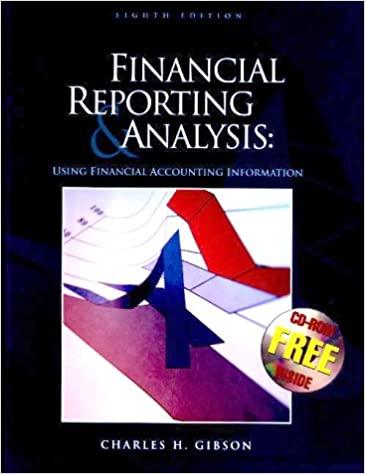For the year ended June 30, 2001, A.E.G. Enterprises presented the financial statements shown on the next
Question:
For the year ended June 30, 2001, A.E.G. Enterprises presented the financial statements shown on the next page.
Early in the new fiscal year, the officers of the firm formalized a substantial expansion plan. The plan will increase fixed assets by $190,000,000. In addition, extra inventory will be needed to support expanded production. The increase in inventory is purported to be $10,000,000.
A.E.G. ENTERPRISES Balance Sheet for June 30, 2001 (In thousands)
Assets Current assets:
Cash $ 50,000 Accounts receivable 60,000 Inventory 106,000 Total current assets $216,000 Property, plant, and equipment $504,000 Less: accumulated depreciation 140,000 364,000 Patents and other intangible assets 20,000 Total assets $600,000 Liabilities and Stockholders’ Equity Current liabilities:
Accounts payable $ 46,000 Taxes payable 15,000 Other current liabilities 32,000 Total current liabilities $ 93,000 Long-term debt 100,000 Stockholders’ equity:
Preferred stock ($100 par, 10% cumulative, 500,000 shares authorized and issued) 50,000 Common stock ($1 par, 200,000,000 shares authorized, 100,000,000 issued) 100,000 Premium on common stock 120,000 Retained earnings 137,000 Total liabilities and stockholders’ equity $600,000 A.E.G. ENTERPRISES Income Statement For the Year Ended June 30, 2001
(In thousands except earnings per share)
Sales $936,000 Cost of sales 671,000 Gross profit $265,000 Operating expenses Selling $ 62,000 General 41,000 103,000 Operating income $162,000 Other items:
Interest expense 20,000 Earnings before provision for income tax $142,000 Provision for income tax 56,800 Net income $ 85,200 Earnings per share $ .83 The firm’s investment bankers have suggested the following three alternative financing plans:
Plan A: Sell preferred stock at par.
Plan B: Sell common stock at $10 per share.
Plan C: Sell long-term bonds, due in 20 years, at par ($1,000), with a stated interest rate of 16%.
Required
a. For the year ended June 30, 2001, compute:
1. Times interest earned 2. Debt ratio 3. Debt/equity ratio 4. Debt to tangible net worth ratio
b. Assuming the same financial results and statement balances, except for the increased assets and financing, compute the same ratios as in (a)
under each financing alternative. Do not attempt to adjust retained earnings for the next year’s profits.
c. Changes in earnings and number of shares will give the following earnings per share: Plan A—.73 Plan B—.69 Plan C—.73. Based on the information given, discuss the advantages and disadvantages of each alternative.
d. Why does the 10% preferred stock cost the company more than the 16%
bonds?
Step by Step Answer:

Financial Reporting And Analysis Using Financial Accounting Information
ISBN: 9780324023534
8th Edition
Authors: Charles H Gibson





